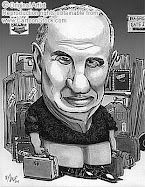 The False Memory Syndrome Foundation (FMSF) has propogated the belief that memory repression is a big fat red herring. Never mind that repressed memory is the foundation of all psychotherapies, that it is reasonably common among stressed war veterans and other sufferers of PTSD ... false memory theory only applies to abused children, of course - and in a courtroom setting where big-big legal fees are collected for testifying that memories cannot possibly be repressed when they involve abuse, and must therefore be "false."
The False Memory Syndrome Foundation (FMSF) has propogated the belief that memory repression is a big fat red herring. Never mind that repressed memory is the foundation of all psychotherapies, that it is reasonably common among stressed war veterans and other sufferers of PTSD ... false memory theory only applies to abused children, of course - and in a courtroom setting where big-big legal fees are collected for testifying that memories cannot possibly be repressed when they involve abuse, and must therefore be "false." Sure-sure. So now a study comes along that demonstrates memories can be repressed by a simple act of concentration. The FMSF is wrestling with this one, but will invent some new fast-talk to pass off as legitimate psychiatry.
Meanwhile, sufferers of repressed memory of abuse, particularly the ritual variety, are persecuted by a legal system that has been heavily influenced by the child brutalization advocates of the FMSF.
- Alex Constantine
http://www.psychiatrictimes.com/psychiatryNews/showArticle.jhtml?articleID=201001156&cid=BreakingNews
July 12, 2007
Practice Forgetting and Memories Fade
Reviewed by Zalman S. Agus, MD; Emeritus Professor at the University of Pennsylvania School of Medicine.
This study suggests that, with practice, we can learn to forget emotion-laden images, in a process that appears to be under conscious control.
BOULDER, Colo., July 12 - With practice, people can learn to suppress emotional memories, researchers here found.
Their study may have clinical implications for those suffering from post-traumatic stress syndrome or obsessive-compulsive disorder, Brendan Depue, a doctoral candidate at the University of Colorado, and colleagues reported in the July 13 issue of Science.
And it may also re-ignite the debate over so-called repressed memories, a topic that has been highly controversial in recent years.
The process of suppressing a memory has two stages and is under the control of the prefrontal regions of the brain, the researchers noted.
To test the degree to which people could suppress specific memories, the researchers first trained 16 participants to associate 40 neutral images of human faces with more emotion-laden pictures, such as a car crash or a wounded soldier.
After they memorized the pairs of images, the volunteers were placed in magnetic resonance imaging scanners.
Then they were shown 32 of the faces 12 times each in a pseudo-random order. For some pictures they were told to think about the associated disturbing image, for others, they were told not to think about it. The remaining eight pairs of faces and images were used as a baseline.
The use of the cue image only ensured that the subjects had to mentally manipulate their memory of the other image, Depue and colleagues said.
In the testing phase of the experiment, they were shown all 40 cue images and asked to give a short description of the associated image.
Analysis found that on average the volunteers were able to recall 62.5% of the pairs in the baseline group, compared with 71.1% of those they were asked to think about and 53.2% of those they were told not to think about.
Recall was significantly different for the "think" and not-think" groups (at P=0.0006), the researchers found. That was because, compared to the baseline, there was a trend toward better recall in the "think" group and significant reduction of recall (at P=0.02) in the "not-think" group.
The functional MRI scanning showed that two regions of the prefrontal cortex are involved one after the other in suppressing memories, the researchers said.
First, the right inferior frontal gyrus suppresses regions that support the sensory components of the memory, including the visual cortex and the thalamus.
Next, the right medial frontal gyrus suppresses regions, including the hippocampus and amygdala, that support emotional components of the memory.
The results are consistent with "the operation of an active process of suppression" of memory, the researchers said.
"By essentially shutting down specific portions of the brain, [volunteers] were able to stop the retrieval process of particular memories," Depue said.
"We think we now have a grasp of the neural mechanisms at work," Depue said, adding that he and his colleagues "hope the new findings and future research will lead to new therapeutic and pharmacological approaches to treating a variety of emotional disorders."
Not everyone sees the upside to the study.
Commenting on the results, memory researcher Elizabeth Loftus, Ph.D., of the University California at Irvine, fears that the research will be misused as support for the idea that people can "banish horrific brutalization into the unconscious," a notion she has challenged for years.
"This will be used as a supposed piece of proof that [memory] repression has been discovered in the brain," she said. "This is not evidence for that but people will try to pretend that it is."
Pamela Freyd, Ph.D., executive director of the False Memory Syndrome Foundation in Philadelphia, noted that the images used in the experiment, while disturbing, were not personally traumatic to the volunteers, so "the results are not at all surprising to me."
But memories of real trauma can be "intrusive and worrisome" and difficult to avoid thinking about, she said.
Depue agreed that personal trauma may be a different kettle of fish. "A person could need thousands of repetitions of training to suppress such memories," he said. "We just don't know yet."
The study was supported by the University of Colorado at Boulder. The authors made no declaration with respect to potential conflicts.
Primary source: Science
Source reference: Depue BE et al. "Prefrontal Regions Orchestrate Suppression of Emotional Memories via a Two-Phase Process." Science 2007;317:215-19.
http://www.psychiatrictimes.com/psychiatryNews/showArticle.jhtml?articleID=201001156&cid=BreakingNews




